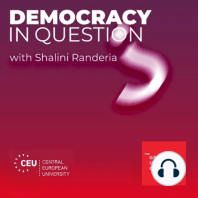25 min listen

The Fragility of US Democracy and the Genuine Threat of Fascism it Faces
The Fragility of US Democracy and the Genuine Threat of Fascism it Faces
ratings:
Length:
34 minutes
Released:
Aug 31, 2022
Format:
Podcast episode
Description
Guests featured in this episode Jason Stanley; Professor of Philosophy at Yale University, and author of five monographs, including, most recently, the acclaimed How Propaganda Works and How Fascism Works. Jason is also a renowned public intellectual who has written extensively on fascism, authoritarianism, propaganda, free speech, critical race theory, and mass incarceration for The New York Times, The Washington Post, The Guardian, Project Syndicate, or The Chronicle of Higher Education. He appears regularly on CNN, NBC, CBS, or Democracy Now, and has been consulted by the January 6 Committee of the US Congress. GLOSSARYWhat is the January 6 Committee? (00:1:10 or p.1 in the transcript)The January 6 Committee was created by Congress to investigate the circumstances around the attack on the Capitol, to recommend “changes in law, policy, procedures, rules, or regulations” to prevent future acts of violence, and “to strengthen the security and resilience of the United States and American democratic institutions.” It was created with a near party-line vote in June 2021, with only the two Republicans who ended up on the committee, Liz Cheney and Rep. Adam Kinzinger (R-IL), voting for it. With its broad mandate, the committee has interviewed over 1,000 witnesses and focused intensively on the actions of Donald Trump in the weeks and months before the pro-Trump mob stormed the Capitol on January 6. Since June, the committee has held eight public hearings geared at assembling a cohesive, comprehensive story of the organized, multi-pronged effort to overturn the result of the 2020 presidential election, with Trump at its center.The committee doesn’t have the authority to punish anyone. Source: What is the Moore v. Harper case? (00:6:51 or p.2 in the transcript) The Supreme Court agreed to hear in October 2022 the case of Moore v. Harper, a North Carolina case that concerns gerrymandering, voting districts, and a little-known theory called the independent state legislature doctrine. Should the Court rule in North Carolina's favor, the ruling would reduce voter oversight on state legislatures and likely impact the outcome of various statewide political races — as well as the 2024 presidential election. Moore v. Harper centers around congressional maps drawn by Republican lawmakers in North Carolina following the 2020 census. The maps were challenged in court by Democratic voters and nonprofits who argued the districts were unfairly gerrymandered in favor of Republicans, which violated the state constitution. Earlier this year, the North Carolina Supreme Court blocked the state from using the maps in primary elections and required the districts be redrawn. Republican state lawmakers in February 2022 requested in an emergency appeal that the United States Supreme Court halt the state's order to redraw the maps, though the request was denied. The new maps, drawn by North Carolina Supreme Court-appointed experts, were used in the state's May 17 primary election. In another appeal to overturn the state Supreme Court's decision, Timothy K. Moore, the Speaker of the North Carolina House of Representatives, filed a request that the United States Supreme Court review the case. The review was granted on June 30 with the case to be heard in the Supreme Court session this October. Source: What is the “Don’t Say Gay law”? (00:12:17 or p.4 in the transcript) The bill passed by Florida’s Senate is giving parents greater power over what goes on in local schools and on classroom discussions about sexual orientation. The bill titled Parental Rights in Education, states that lessons about sexual orientation are banned outright in kindergarten through third grade. It also prohibits lessons in other grades unless they are "age-appropriate and developmentally appropriate." The measure, which would give parents the right to sue school districts, it is scheduled to go into effect on July 1, 2022. The bill's supporters say it strengthens parental rights by
Released:
Aug 31, 2022
Format:
Podcast episode
Titles in the series (77)
When and how is power visible in politics? by Democracy in Question?